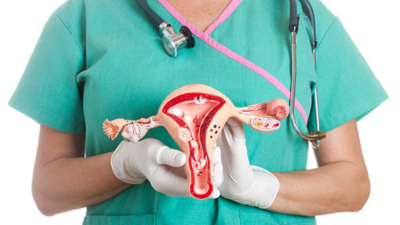
Cervical cancer is a type of cancer that develops in the cervix, the lower part of the uterus. It is primarily caused by persistent infection with high-risk strains of the human papillomavirus (HPV). Early stages often have no symptoms, but advanced cases may cause abnormal bleeding, pelvic pain, or discomfort during intercourse. Regular Pap smears and HPV vaccinations significantly reduce the risk by detecting precancerous changes early. Treatment options include surgery, radiation, and chemotherapy. Maintaining a healthy lifestyle and practicing safe sex can also help prevent cervical cancer. Early detection is key to improving survival rates and successful treatment.
Here are a few myths that needs to be addressed.
Myth: Cervical cancer is hereditary
Unlike Breast and Ovarian cancer, cancer of the cervix is not hereditary.
It is caused by persistence of a sexually transmitted viral infection called Human. Papilloma Virus (HPV) many years after being exposed.
Myth : HPV infection means cervical cancer
HPV infection by no means is the same as cervical cancer. In most cases, the infection clears up with no future risk. It’s only in a small subset of patients that it can persist and slowly cause changes of pre cancer and cancer over many years.
Myth : HPV in not common
HPV is a sexually transmitted (STI) viral infection which is very commonly contracted by sexually active women. It comes in 2 variants: Low Risk which is linked to genital warts, and high risk which is linked to cervical cancer.
Having multiple sexual partners, smoking, poor immunity, increase your chances of contracting the infection.
Myth : HPV infection can be treated with medicines
There is no medical treatment to help clear an HPV infection. Once contracted, the virus can remain latent for many years and eventually cause cancer cervix. Fortunately, majority of the patients clear it up by developing a natural immunity to the virus in 2 years. Quitting smoking and adopting healthy lifestyle changes can help your immunity clear it up faster. You can however, an immunity prior to exposure by taking the HPV Vaccine.
Myth : Cervical cancer always has symptoms
In its early stages, cervical cancer may not cause any symptoms. Hence the need for routine pap smears and HPV testing even in women who do not have any symptoms to identify the disease in its Precancerous stage when it is completely curable with conservative approaches.
Myth : Pap smears are painful
Pap smear is a simple and quick screening test which may cause slight discomfort for a few seconds, but is generally not painful.
Myth : Cervical cancer can happen only to those who have multiple sexual partners
HPV is a very ubiquitous viral infection which can be contracted even by women who have just one sexual partner.
Myth : Pap smears must be done every year
Pap smears are recommended in all sexually active women every 3-5 years from Ages 21-65 yrs.
Myth :HPV infection is unavoidable
Although it is a ubiquitous virus, we can avoid contracting the High Risk HPV infections by taking the HPV Vaccine prior to exposure, ideally before getting sexually active. The vaccine is recommended in 9-11 year old girls and boys, and covers for the most prevalent High risk strains as well as the strains which cause genital warts.
Myth : If I’m already sexually active , I cannot take the vaccine
Although it is recommended in 9-11 year old girls, the vaccine can be taken by women up to the age of 45 years.
Dr. Neha Abhijit Pawar, Consultant, Gynaecology, Kokilaben Dhirubhai Ambani Hospital, Mumbai

















